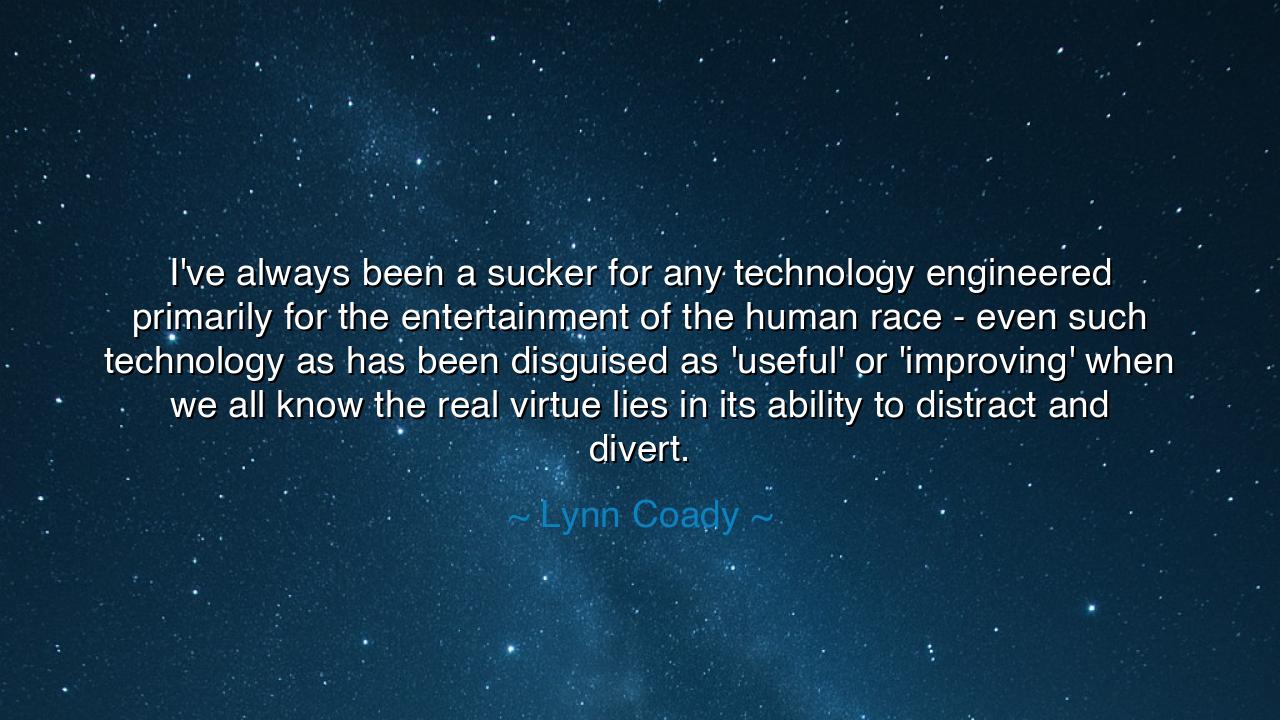
I've always been a sucker for any technology engineered
I've always been a sucker for any technology engineered primarily for the entertainment of the human race - even such technology as has been disguised as 'useful' or 'improving' when we all know the real virtue lies in its ability to distract and divert.






Lynn Coady, with the wit of a philosopher cloaked in the tongue of the modern age, speaks thus: “I’ve always been a sucker for any technology engineered primarily for the entertainment of the human race – even such technology as has been disguised as ‘useful’ or ‘improving’ when we all know the real virtue lies in its ability to distract and divert.” At first, these words may seem playful, even humorous, but beneath their surface lies a profound reflection on the nature of invention and the restless heart of mankind. For though the wise often speak of progress as a path toward utility, safety, and efficiency, it is often entertainment—the sweet diversion of the spirit—that drives our deepest longings.
Indeed, from the dawn of civilization, humans have not lived by bread alone. The plow fed the body, but the lyre fed the soul. The wheel carried goods across lands, but the theatre carried emotions across hearts. What Coady reveals is this eternal truth: that technology, whether cloaked in usefulness or not, often finds its highest power in its ability to distract and divert, to draw us away from the burdens of toil and the weariness of sorrow. Distraction, far from being mere folly, is the balm of existence, the respite that renews our courage to face another day.
Consider the Romans, who erected aqueducts and roads that bore the mark of utility, but who also built the Colosseum and amphitheaters where gladiators fought and actors performed. Though emperors proclaimed that such spectacles upheld virtue, discipline, or national pride, the people knew the truth: it was entertainment, the grand diversion of the masses, that bound them together. Bread kept them alive, but the games made them feel alive. Technology served both the belly and the spirit, but it was the spirit’s delight that gave the empire its pulse.
Nor is this truth absent in our own age. When the television first entered homes, it was proclaimed a tool of education, a way to spread knowledge across vast lands. And yet, its greatest triumph lay in the laughter of comedy, the thrills of drama, the collective awe of millions gathered before a flickering screen. Likewise, the smartphone was praised for productivity, connection, and navigation, but in secret it is the endless scroll of diversions, the games, the songs, the videos, that command the greatest loyalty of our hearts. Thus Coady unmasks what many conceal: that the “improving” guise is often but a cloak for the joy of play.
Yet let us not despise this truth. To seek distraction is not weakness, but a recognition of our nature. Life is a labor, heavy and unending. Even the mightiest warriors rested by firelight, listening to tales sung by poets. Even the wisest philosophers strolled in gardens, diverting themselves with conversation. Diversion has always been the medicine of endurance. Without it, man becomes machine; with it, he remains human. Therefore, when Coady admits she is “a sucker” for such inventions, she speaks not of folly but of honesty—for in delight, we find restoration.
But let the listener beware: there is a line between distraction that restores and distraction that enslaves. The wine that gladdens the heart can also drown it. The theatre that inspires courage can also breed idleness. The screen that unites can also isolate. Thus the ancient wisdom must be remembered: “All things in measure.” Embrace entertainment as a gift, but never let it steal the hours of creation, of love, of true living. Let it refresh you, not consume you.
Therefore, O seekers of balance, take this lesson: do not scorn the technologies of entertainment, for they are as old as humanity’s longing for song and story. But wield them as you would a lyre, a cup, a torch—with joy, with moderation, with purpose. When weary, let them comfort you; when restless, let them inspire you. But do not forget that true life lies not in endless diversion, but in the harmony of work, rest, play, and growth.
In the end, Coady’s words remind us that the heart of man is not moved solely by necessity, but by the delight of being moved at all. So embrace your diversions, cherish your distractions, but master them—lest they master you. For in the art of balance lies the secret to both joy and wisdom, and in the wise use of entertainment lies the strength to endure the long road of life.






AAdministratorAdministrator
Welcome, honored guests. Please leave a comment, we will respond soon